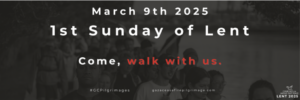
First Sunday of Lent
March 09, 2025
Deuteronomy 26:1-11 | Psalm 91:1-2, 9-16 | Romans 10:8b-13 | Luke 4:1-13
Romans 10:8b-13
8 But what does it say? “The word is near you; it is in your mouth and in your heart,” that is, the message concerning faith that we proclaim: 9 If you declare with your mouth, “Jesus is Lord,” and believe in your heart that God raised him from the dead, you will be saved. 10 For it is with your heart that you believe and are justified, and it is with your mouth that you profess your faith and are saved. 11 As Scripture says, “Anyone who believes in him will never be put to shame.” 12 For there is no difference between Jew and Gentile—the same Lord is Lord of all and richly blesses all who call on him, 13 for, “Everyone who calls on the name of the Lord will be saved.”
First Sunday of Lent Devotion
by Destiny Magnett
As I reflect on this passage in the context of the Gaza Ceasefire Pilgrimage (GCP) movement, I cannot help but be reminded of the many opportunities we have to proclaim our love of Jesus. We can proclaim our love in words, of course, and on Sundays as we worship and pray together. But, as the Gaza Ceasefire Pilgrimages around the world showed us, we ought also to think about embodying our commitments to Christ through our actions.
On the day of the Washington, D.C. Gaza Ceasefire Pilgrimage, we rose well before dawn to cold, rainy weather. In Washington, the heart of the American empire, we designed our pilgrimage stops to be particularly symbolic, representing the spirit of justice and peace we hoped would embody the movement in its entirety. From the Washington National Cathedral, to the Martin Luther King, Jr. Memorial, to our final stop at the White House, there was something so profound about walking 23 miles across our Nation’s Capital. As explained by the GCP ‘Liturgy of Change’ mapping Gaza onto DC with our bodies produced a profound sense of both solidarity and sorrow. With every mile in the rain, I began to let myself feel more fully the grief that had lived for so many months at the periphery of my consciousness each time I saw another image of the destruction of the Gaza Strip. On a communal level, and because of the place in which we walked, I was also overcome by a deep sense of responsibility. The destruction of Gaza has occurred, after all, with bombs marked “made in the U.S.A.”
And so there we walked, with our banner, amid the cherry blossoms and patriotic tourists, doing all we could to make the suffering visible – for those around us, and for ourselves.
I think my experience of the day was captured best in this journal entry I wrote on my long train ride back to Boston after the march, which read:
What I did not expect was the potency of the affective environment that the walk created. I felt as if my soul was stripped bare, and I let myself feel the sorrow, lamentation, and pain that has been so heavy on my and so many of our hearts. But at the end of the walk, as I opened our closing prayer vigil in front of the White House, I could only think about hope. So I called for repentance, and I called for embodied prayer, and I called for us to not lose hope.
Here, I can’t help but think of Womanist theologian Emilie Townes, who, in an article for Yale Divinity School, says:
“laments tell the truth of the suffering… Laments mark the beginning of the transformation process… so we name the horrors… and it reminds us that we must always show up in the face of relentless evil, particularly in such times when it appears so normal and natural in our midst.”
This, to me, is what it means to hope. Just like lament, it is not enough to hope alone. Hope must be connected to action. And action can be embodied in liturgy– but also in peaceful protest, political action, and community (un)learning. So, this Lenten season, when we read these words from Romans, professing that “the word is in your mouth and heart,” let us proclaim our faith not only in words, but in communal acts of solidarity, by our refusal to look away from the horrors, and through our embodied cries of lament for those marginalized and oppressed.
Though a year has passed since this D.C. March, and at the time of writing this devotional, a fragile ceasefire has taken place between Hamas and Israel, the violence has not ended. Each time I open my news feed, I see images of pain – raids on Jenin refugee camp, homes being destroyed in Masafer Yatta, and so much more. But I also hear voices of Palestinians calling for steadfastness, for sumud, that defies these cycles of violence and oppression. This moment calls for us to hold all of it together with courage and compassion. So this is my prayer for us all, on this first Sunday of Lent:
O Merciful God,
In your enduring and expansive strength:
Help us to hold sorrow with tenderness in our hearts
Help us to act courageously for justice
Help us to speak honestly in the face of violence
Help us carry the weight of our complicity and responsibility
Help us remain steadfast in the midst of lament
Help us to love generously and unwaveringly.
And may we each come to know our role in bringing about your Kingdom on earth.
Amen.
Destiny Magnett is the Programs and Outreach Manager at Churches for Middle East Peace (CMEP). She holds a Master of Theological Studies and Graduate Certificate in Religion & Public Life from Harvard Divinity School.

To read the previous devotional click here: https://cmep.org/prayers4peace-ashwed2025/

